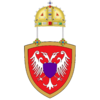Yanwen
| Yanwen | |
|---|---|
| Flag | Coat of arms |

|

|
| Motto: Mana Qonqasunchikchutaq
"Nevertheless, we will not forget" | |
| Anthem: Ten Thousand Years | |
| Locator map | |
 | |
| Capital city | Jīndu (金都) |
| Largest city | Jīndu (金都) |
| Official language | Yannic |
| Other languages | |
| Ethnic groups | Yan |
| Religion | |
| Demonym(s) | Yan |
| Government | |
| Government Type | Imperial Oligarchy |
| Emperor | |
| White Elder | |
| Red Elder | |
| Blue Elder | |
| Black Elder | Zédù Dài (窄肚䲦) |
| Grey Elder | |
| Rose Elder | |
| Violet Elder | |
| Green Elder | |
| Legislature | The Tǒnghuì (統會) |
| Establishment | |
| The Founding of Qheca | date 1 |
| Area | |
| Total | 6,896,101.99 km2 |
| Water % | 0.0% |
| Population | |
| Total | 794,996,430 |
| Density | 115.28/km2 |
| Economy | |
| Economy type | Communitarian Capitalism |
| GDP (total) | Ꞡ 1,873,465,872,308.74 |
| GDP per capita | Ꞡ 2,356.57 |
| Currency | samp_nat_currency |
| Currency symbol | |
| Inequality index | 0.0 |
| Development index | 0.0 |
| Other information | |
| Time zone | 0 |
| Driving side | right |
| Calling code | |
| Internet code | .ch |
Yanwen (嫣文) is a large country in western Davai, bordering the Sensumen Sea, as well as the islands of Kamura, to the west. Yanwen is notable as being a civilization of eight bèi (輩) or factions, each of which has competing interests in the empire; the emperor, all-powerful though he technically may be, is there to act more as a referee. Despite this, each faction has seen its way to advancing the development of Yanwen considerably as time has gone on. Yanwen is also historically famous for its silk and its tea.
Etymology
Yanwen is derived from yān (嫣), itself derived from the Old Yannic word *qhran, meaning "beautiful". Yān as a word is used for both the primary river system in Yanwen, and for the Yan people who spread out from along its banks. The second word, wén (文), more broadly refers to "culture", the essence of the people who live there rather than the land itself. Wén, for the Yan people, effectively means "nation".
History
In recent centuries, the bèi have become more obstreperous, each seeking their own dominions within the country and outside it. To their minds, colonial efforts should be permitted without fear of disagreement from nearby nations; they are, after all, the legitimate successors to the empire of Shuǎng (爽), who once laid claim to the entirety of the known world.
Government
The Factions
It is impossible to understand the culture of Yanwen without discussing the bèi. This word, while in the modern day referring to something that might be translated as "faction", initially meant something closer to "moiety". In historical Yanwen, one passed from one moiety to another over the generations, in a specific cycle, dictating certain rituals that one could perform and certain groups that one could not marry into.
Economy
Under Yannic law, the emperor owns all land, all resources, and all infrastructure within the country. In practice, much of this is "loaned" to various bèi, for some part of the decade, in order for them to make adequate use of the land and resources. There is a single currency, but each bèi has its own banks even if it does not maintain its own mints.
The majority of the people of Yanwen belong to one faction or another. Individually, they do not earn a great deal; the majority of their wealth goes straight to the factions, who nevertheless see it in their best interests to maintain the infrastructure provided by the Imperial Government.